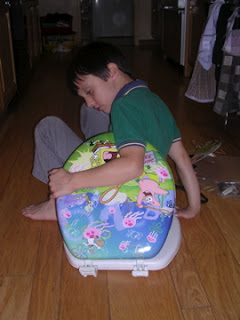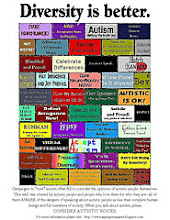
For a faster loading version of this site visit here:- Whitterer On Autism
It’s an innocuous enough word. There again, it is a ubiquitous word here in America. In every other country, ‘transition’ merely means change, they’re pretty much interchangeable. Out here, ‘transition,’ is used most commonly with reference to children, as in ‘he doesn’t transition well,’ otherwise known as a 'meltdown.' And yes, it’s nearly always ‘he.’ More simply, it means he finds it difficult to stop doing that, and start doing this.
I came face to face with this word several years ago. I was trying to leave the YMCA with my three littlest ones. Junior was strapped to my chest, his fingers entwined in my hair and screaming. The other two were in the double stroller. They were also both screaming. The front one held the wheels, the second one gripped the door jam, preventing our departure. A kindly woman remarked "my! they sure do have a little trouble transitioning!" She might as well have been speaking Swahili to me for all I understood.
Many children, and some adults I can think of, have trouble transitioning. However, if you are autistic, transitions always result in a meltdown. You may not think that is so very dreadful, until you examine how many transitions there are in the average day.
Lets take the first five minutes of your typical day; you wake up, you fall or bounce out of bed, visit the bathroom, clean your teeth, stagger down stairs, put the coffee on and reach for the newspaper. Sounds about right? Approximately? Give or take? Right. Each one of those is a transition. 7 transitions, seven changes, seven meltdowns, and that’s just the first five minutes.
So lets just imagine that we can fast forward and skip the first 7 meltdowns of the day. Pick another time of the day. Pick another time of the day when you were a child. Remember being a child? So the end of the school day approaches. Horray! Gather books and belonging, leave class room, find parent, get in car and drive home, into the garage, skip into the house for snack and T.V., oh no, perhaps not T.V., more likely homework. Were you counting? Right, 8 transitions, 8 meltdowns. Beginning to make some sense?
This is why autistic parents and their children are so inefficient. This is why every tiny thing takes 8 times longer than it would for a ‘typical’ person.

Still dubious?
One more example then. Say you’ve decided that since it’s the weekend, it might be an idea to take a little trip. Scratch that, the schedule is still pretty full with three small children at home, how about, instead, we go for just a couple of hours to the park? Deal? Great. Use the toilet, wash hands, gather bikes or sand toys, put on your shoes and socks, or other footwear, leap into the car and you’re off. Only five transitions, only five meltdowns, although of course two of them are autistic, not just one, so that’s two times 5, which would be ten meltdowns. You think I’m exaggerating? Lets tear it apart a bit.
Firstly, no-one wants to go to the park, going to the park is not fun. Going to the park means being ‘outside’ and ‘outside’ is always bad. In addition, even if the ‘park’ were an ‘indoor’ or covered park, it would still count as outside, because it’s not home. Everything that isn’t home, school or therapy, is ‘outside.’
Perhaps you could pick one of those real indoor places, like bowling, jungle gyms or other children’s entertainment places. For now we will ignore the fundamental difference, that the park is free and all these other places involve hard cash times 3. You’d still have the same fundamental problem; it is unknown, it is not preferred, it is not home and involves a transition.
So far so good. Next. Use the toilet before departure. No-one wants to, they need to stop what they’re doing, even if it’s something that they’re not actively enjoying, like homework, and do something else, namely go to the toilet, which means that it is a transition. We hate transitions, no-one is going to use the toilet willingly.
Added to this, everyone has to remove every item of clothing in order to use the bathroom. The two activities are connected; toilet = naked. It’s unfortunate that these two are connected, they shouldn’t be, that’s my fault for being a lax mother, but that aside, for the moment, the reality is, that they are connected.

Once everyone is naked, they need to get dressed again in order to go out to the park. Getting dressed is a transition, no-one wants to get dressed, even if they didn’t have poor fine motor skills which makes buttons, Velcro and zips a form of torture.
This skips over the issue of sequencing; knowing that you need to put your clothes on in a certain order, unless you want to end up looking like superman with your underwear on the outside. It also ignores the problem that scattered clothes, even once they are gathered together, in fact probably because they are gathered together, become an amorphous heap, unrecognizable as clothing. Now they are a lump and possibly a tangle. The tangle of a puzzle that cannot be unraveled by those who only see ‘parts’ and do not recognize ‘wholes.’
We skipped ‘washing hands,’ I only wish we could. No-one wants to wash. If they have to wash, one needs cold water, the other doesn’t care about the temperature or being wet. One will have an apopleptic fit if so much as a drop of water touches any part of his anatomy or clothes, other than his hands. The other could be drenched, would prefer to be drenched, but that would mean another session of dressing.
It probably will involve another session of dressing anyway, because the other one experienced a droplet of water on his knee, during the washing hands session and will therefore be naked again. You need to bear in mind, that whilst it make take them 45 minutes to dress themselves, they can be naked in less than one second, some kind of inverse relationship there.

Ignoring the issue of dressing and washing, we move swiftly on to choosing items to accompany us to the park. Bikes or sand toys? Neither actually, because no-one wants to go to the park, so why should anyone choose something to take with them? This is apart from the fact that choosing, the act of making a positive decision about anything, is also impossible. Not only is it impossible, it is also aversive. Aversive means a guaranteed meltdown, times 2.
Where are we now? Oh yes, shoes and socks or other footwear. Lets ignore the issue of choosing the footwear, you the parent, intervene and choose the lesser of two evils, namely sandals. Sandals are great because this obviates the need to put socks on, that makes the exercise speedier, that’s four socks that don’t have to be put on four feet, in addition to the shoes. Half the time. There again, all footwear is aversive, contemptible. Not only does no-one want to put shoes on, they also don’t want to put them on because it is a precursor to being able to leave for the park, which they also don’t want to do. So there is no motivation to put hateful shoes on delicate feet.
This issue can be overcome by a bribe. The only kind of bribe that will work in this situation is candy [translation = sweeties] This is the lowest common denominator, a quick fix. You think I should use some other kind of motivator, I can see that. How about they put them on to please me, to make me proud of them? Nope. They don’t care what I think or feel and they certainly don’t want to please me. Perhaps I could appeal to another element of their nature, something along the lines of “Wow, let me see what big [independent] boys you can be, show me you can do it, I’m going to be so proud of you if you can do this?” Sound good? Sounds like a step in the right direction? Sounds like it should be, but of course it isn’t. They don’t want to be grown up, they’re quite happy as they are thank you very much. They don’t want to make me proud, they don’t want to demonstrate skills of independence. They don’t want to go to the park.
Any other ideas? The sooner you get your shoes on, the sooner we can go to the park? Obviously wrong for the reasons above. The most natural encouragements are actually the worst choices for these boys, it’s all counter intuitive, you need to think backwards, you need to think inside out.
O.k.. Last step. Get into the car. The last step is actually the hardest step. You may be familiar with the nightmare of abductions, where the kidnapper grabs the victim from the street and tries to stuff them in the car. The victim knows that they must resist, they must avoid, at all costs being taken to the next destination, the second location. This is the final crunch they must resist, failure now, will mean certain death. It’s the same here, resist getting in the car, because if you don’t succeed now, you will be transported to the park against your will.
You doubt my veracity? You think I’m exaggerating? ‘But it’s only a quick trip to the park!’ you sigh. ‘How can that be such a drama?’ you ask. I know, it’s sound unlikely, I find it surreal as well, but the bottom line is, it’s not the park, although that doesn’t help, it’s the ‘getting in the car.’ Getting in the car is the biggest baddest transition, always.
Is there something sub-standard about my car? Do they get car sick? What is the problem with the car? I don’t have a notion what is wrong with my brand new car, nor it’s predecessor, nor it’s predecessor. It’s not the car itself. It’s not the school bus itself, it’s not spouse’s car either. It also applies to any other type of vehicle that we have experienced thus far; buses British and American, aeroplanes, taxis, here and in Mexico.
So what do you do as the rational parent? O.k. scrub round the park. [translation = scratch that] No park then, no park is a punishment. You were only trying to give them a nice time anyway, so no park, park privileges are withdrawn, you can stay at home instead as a punishment. Right? Trick question, very unfair. No, wrong answer. It’s the wrong way around, you need to think ‘inside out.’ Apart from the issue of persistence and consistency, letting them stay at home is a reward, you are reinforcing the behaviour that you’re trying [very hard] to eradicate. No, you’re going to the park come hell or high water. You will all go to the park, no matter what they do, you will go to the park and follow through.

What will happen at the park? You have a fifty fifty chance of it being a disaster/a success. Who knows? Certainly not me, but the point is to go anyway, and endure whatever they throw at you.



























































